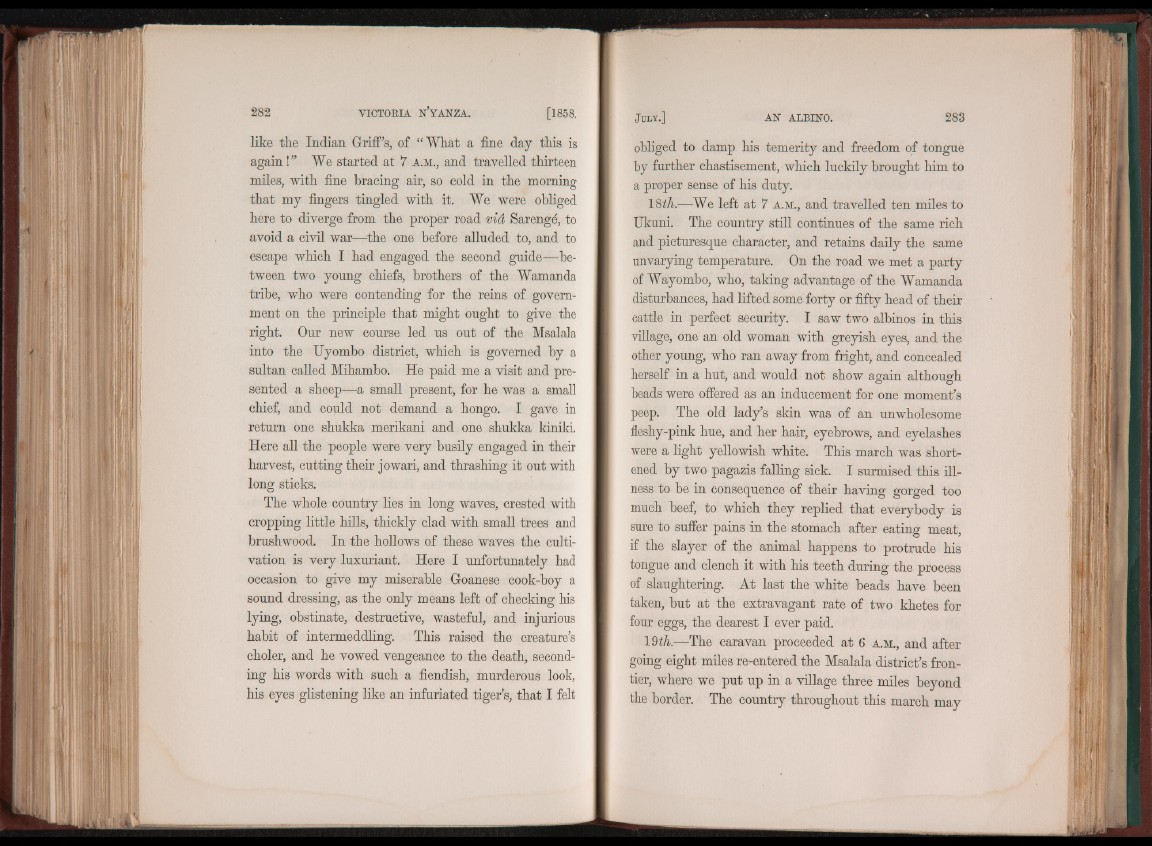
like the Indian Griff’s, of “ What a fine day this is
again I” We started at 7 a .m., and travelled thirteen
miles, with fine bracing air, so cold in the morning
that my fingers tingled with it. We were obliged
here to diverge from the proper road vid Sarenge, to
avoid a civil war—the one before alluded to, and to
escape which I had engaged the second guide—between
two young chiefs, brothers of the Wamanda
tribe, who were contending for the reins of government
on the principle that might ought to give the
right. Our new course led us out of the Msalala
into the Uyombo district, which is governed by a
sultan called Mihambo. He paid me a visit and presented
a sheep—a small present, for he was a small
chief, and could not demand a hongo. I gave in
return one shukka merikani and one shukka kiniki.
Here all the people were very busily engaged in their
harvest, cutting their jowari, and thrashing it out with
long sticks.
The whole country lies in long waves, crested with
cropping little hills, thickly clad with small trees and
brushwood. In the hollows of these waves the cultivation
is very luxuriant. Here I unfortunately had
occasion to give my miserable Goanese cook-boy a
sound dressing, as the only means left of checking his
lying, obstinate, destructive, wasteful, and injurious
habit of intermeddling. This raised the creature’s
choler, and he vowed vengeance to the death, seconding
his words with such a fiendish, murderous look,
his eyes glistening like an infuriated tiger’s, that I felt
obliged to damp his temerity and freedom of tongue
by further chastisement, which luckily brought him to
a proper sense of his duty.
18 th.—We left at 7 A.M., and travelled ten miles to
Ukuni. The country still continues of the same rich
and picturesque character, and retains daily the same
unvarying temperature. On the road we met a party
of Wayombo, who, taking advantage of the Wamanda
disturbances, had lifted some forty or fifty head of their
cattle in perfect security. I saw two albinos in this
village, one an old woman with greyish eyes, and the
other young, who ran away from fright, and concealed
herself in a hut, and would not show again although
beads were offered as an inducement for one moment’s
peep. The old lady’s skin was of an unwholesome
fleshy-pink hue, and her hair, eyebrows, and eyelashes
were a light yellowish white. This march was shortened
by two pagazis falling sick. I surmised this illness
to be in consequence of their having gorged too
much beef, to which they replied that everybody is
sure to suffer pains in the stomach after eating meat,
if the slayer of the animal happens to protrude his
tongue and clench it with his teeth during the process
of slaughtering. At last the white beads have been
taken, but at the extravagant rate of two khetes for
four eggs, the dearest I ever paid.
19th.— The caravan proceeded at 6 A.M., and after
going eight miles re-entered the Msalala district’s frontier,
wdiere we put up in a village three miles beyond
the border. The country throughout this march may